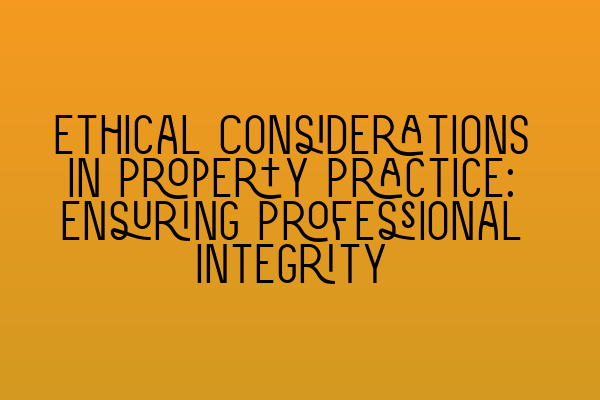Ethical Considerations in Property Practice: Ensuring Professional Integrity
Welcome to the SQE Property Law & Land Law blog! In today’s post, we will be discussing the importance of ethical considerations in property practice. As solicitors, it is crucial that we always prioritize professional integrity in our dealings with clients, colleagues, and the wider community. By maintaining ethical practices, we not only uphold the reputation of our profession but also ensure that justice is served and the rights of all parties involved are protected.
Before we delve deeper into the topic, it is important to understand what we mean by ethical considerations. Ethical considerations refer to the principles and values that guide our decisions and actions as legal professionals. These principles serve as a moral compass, shaping our behavior and influencing the outcomes of our legal practice. In the context of property law, ethical considerations are particularly crucial, given the significant financial and emotional stakes involved in property transactions. Let’s explore some key ethical considerations that property practitioners should always keep in mind:
1. Confidentiality:
Confidentiality is a cornerstone of the solicitor-client relationship. As property practitioners, we have a duty to maintain the confidentiality of client information. This means that any information our clients share with us must remain strictly confidential, unless authorized by the client or required by law. By respecting client confidentiality, we not only build trust and confidence but also protect our clients’ interests.
To learn more about the importance of confidentiality in legal practice, check out our article on SRA Requirements: Meeting the Standards for SQE Qualification.
2. Conflict of Interest:
A conflict of interest arises when a solicitor’s personal or financial interests conflict with those of their clients. It is important to identify and manage conflicts of interest appropriately to safeguard the integrity of our practice. In property practice, conflicts of interest can arise in various situations, such as when representing both the buyer and seller in a transaction. To maintain professional integrity, we must always act in the best interests of our clients and refrain from engaging in any activities that could compromise their interests.
To gain a comprehensive understanding of conflicts of interest in legal practice, we recommend reading our article on Unraveling the SQE Stages: A Roadmap to Success.
3. Honesty and Transparency:
Honesty and transparency are vital in property practice. It is our duty to provide accurate and truthful information to our clients, ensuring they have a clear understanding of the legal implications of their property transactions. This includes disclosing any potential risks or limitations associated with the transaction and providing comprehensive advice to enable clients to make informed decisions. By maintaining honesty and transparency, we uphold our professional integrity and promote trust in the legal profession.
If you want to enhance your skills in providing transparent legal advice, our article on Skills Assessed in SQE: Understanding the Exam Content will provide valuable insights.
4. Respect for Diversity and Inclusion:
In property practice, it is important to have a deep respect for diversity and inclusion. As legal professionals, we encounter clients from various backgrounds and cultures, and it is critical to treat every client with respect and dignity, regardless of their race, gender, ethnicity, or religion. By fostering an inclusive environment and embracing diversity, we create a fair and just society.
To learn more about the importance of diversity and inclusion in legal practice, read our article on Test Centers for SQE: Convenient Locations for the Exam.
5. Professional Development:
Continual professional development is necessary to ensure ethical property practice. As property practitioners, we should stay updated with the latest legal developments, regulations, and ethical codes of conduct. This enables us to provide the best possible service to our clients and maintain our professional integrity. Property law is an ever-evolving field, and it is our duty to adapt and grow alongside it.
If you want to excel in your professional development, our article on Interviewing in SQE: Mastering the Assessment Process will provide valuable insights.
Conclusion:
Ethical considerations play a fundamental role in property practice, ensuring that solicitors prioritize professional integrity and act in the best interests of their clients. By maintaining confidentiality, managing conflicts of interest, promoting honesty and transparency, respecting diversity and inclusion, and investing in professional development, property practitioners can address ethical challenges effectively. This not only upholds the reputation of our profession but also contributes to the delivery of justice and the protection of the rights of all parties involved.
Thank you for reading! We hope that this article has provided you with valuable insights into the importance of ethical considerations in property practice. If you have any questions or would like to learn more, feel free to reach out to us at SQE Property Law & Land Law.
